

 Linux驱动开发_倒车影像项目介绍
Linux驱动开发_倒车影像项目介绍
描述
【摘要】 介绍Linux下倒车影像的项目,完成摄像头图像读取、超声波驱动编写、超声波距离读取。
倒车影像项目
模拟: 汽车中控台---倒车影像。
组成部分:
1. LCD屏: 实时显示摄像头采集的数据。
2. 摄像头: 放在车尾,采集图像传输给LCD屏进行显示。
3. 倒车雷达: 超声波测距--->测量车尾距离障碍物的距离。
4. 蜂鸣器: 根据倒车雷达测量的距离,控制频率。
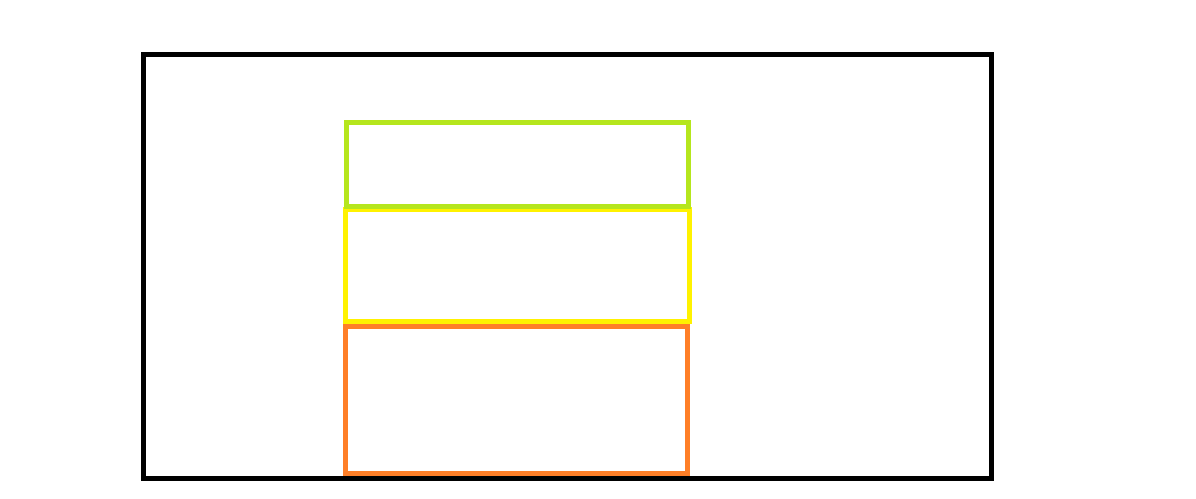
1.1 超声波测距模块
声波测距: 已知声音在空气中传播的速度。
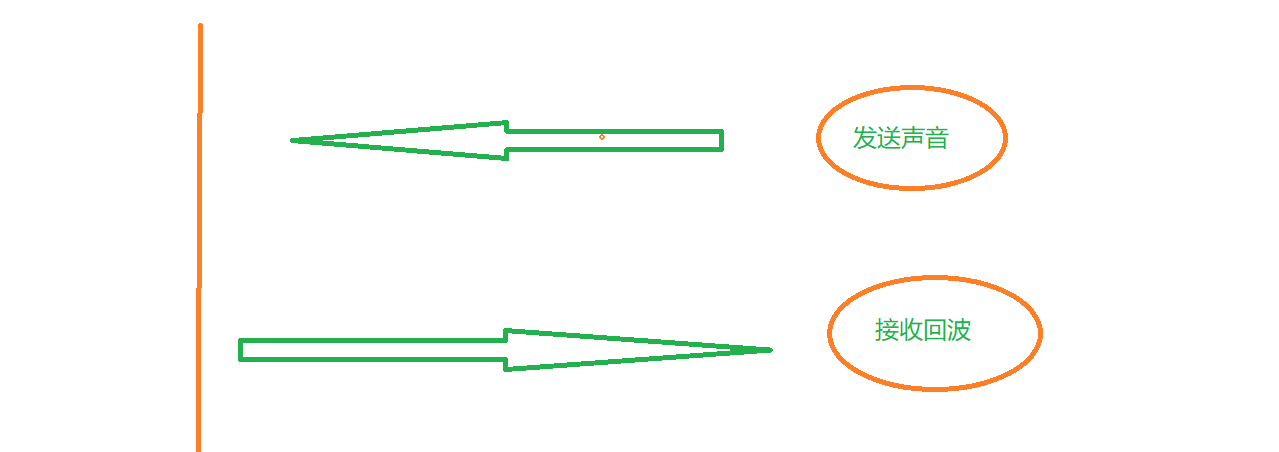
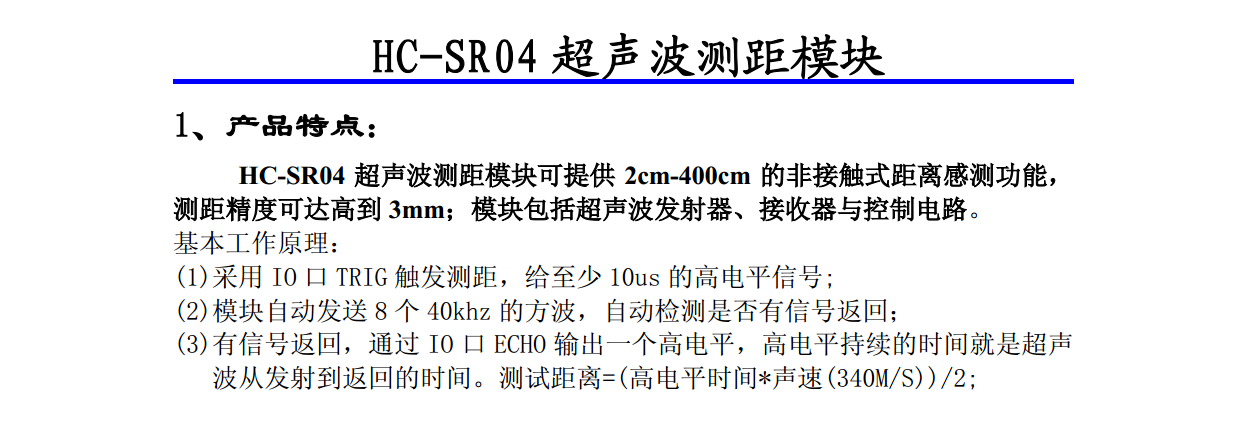
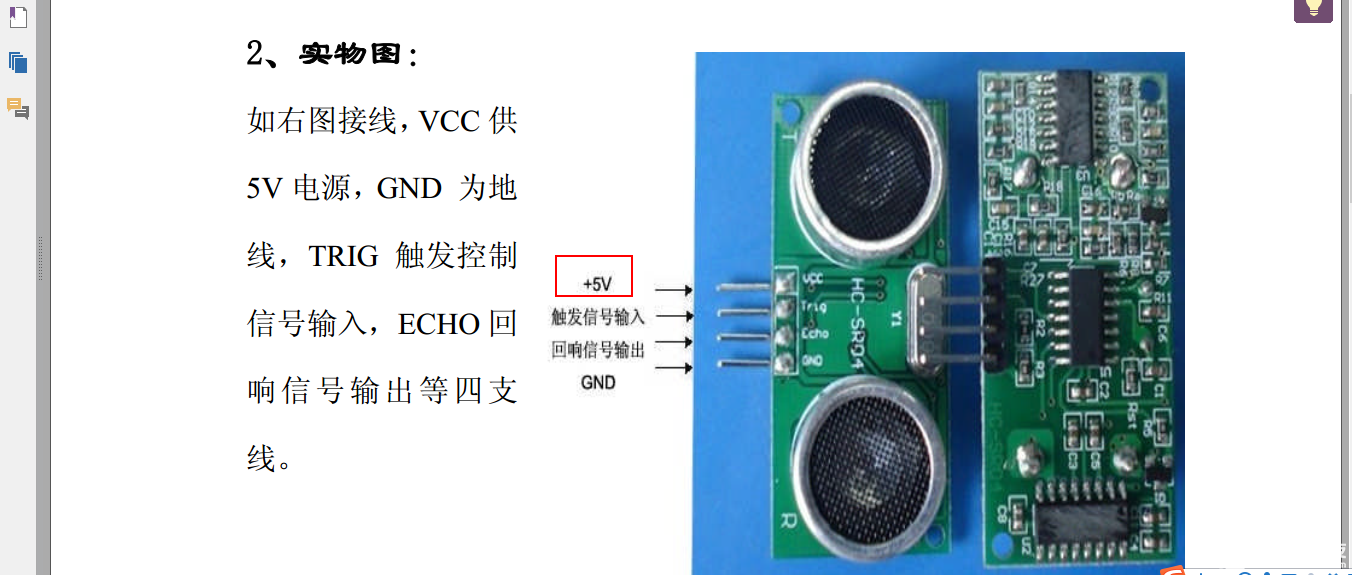
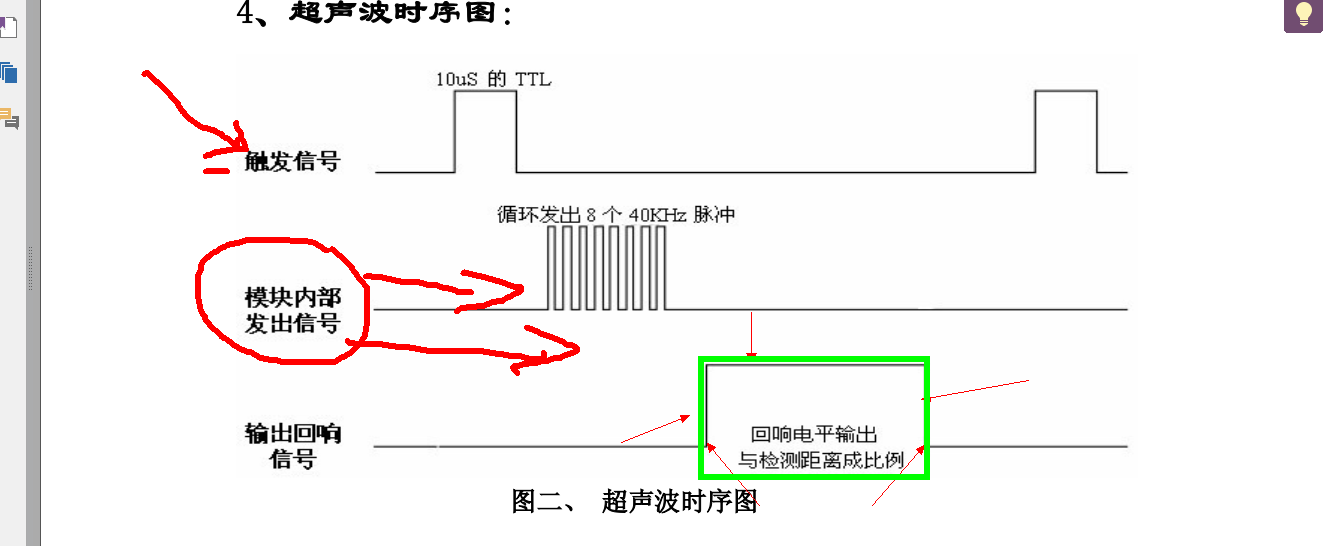
硬件接线:
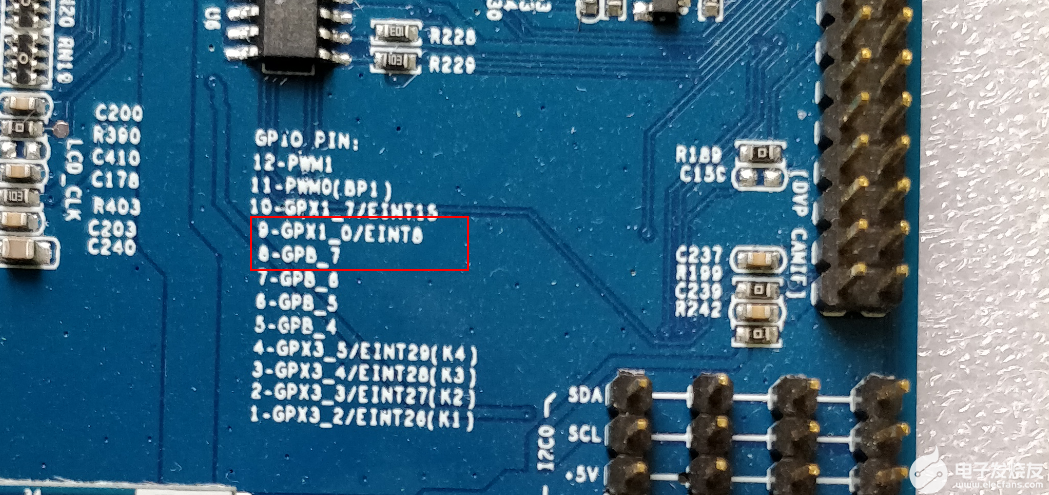
ECHO------->GPX1_0 (开发板第9个IO口): 中断引脚----->检测回波----输入
TRIG ------->GPB_7 (开发板第8个IO口): 输出触发信号。
1.2 PWM方波控制蜂鸣器
PWM方波:



内核自带的PWM方波驱动

1.3 UVC免驱摄像头编程框架: V4L2
编程的框架: v4l2--->全称: video4linux2
V4L2 : 针对UVC免驱USB设备设计框架。专用于USB摄像头的数据采集。
免驱 : 驱动已经成为标准,属于内核自带源码的一部分。
V4L2框架本身注册的也是字符设备,设备节点: /dev/videoX
V4L2 框架: 提供ioctl接口,提供了有很多命令,可以通过这些命令对摄像头做配置。
比如: 输出的图像尺寸,输出图像格式(RGB、YUV、JPG),申请采集数据的缓冲区。
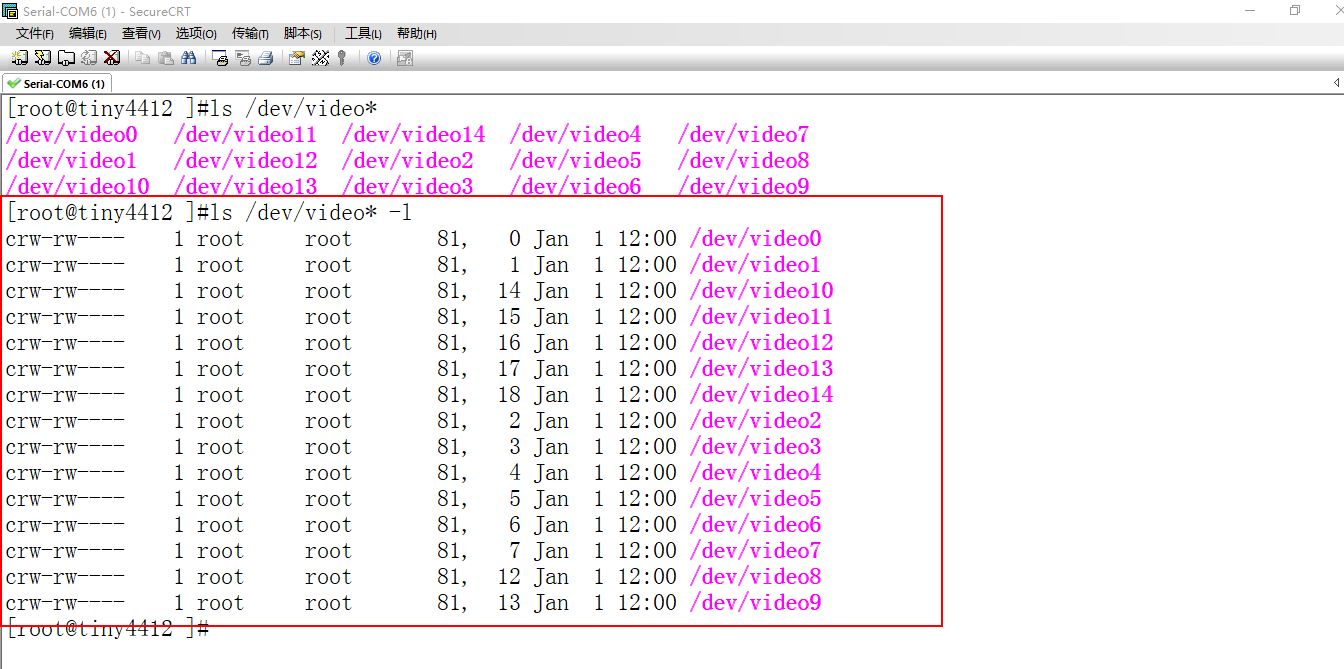

配置摄像头采集队列步骤:
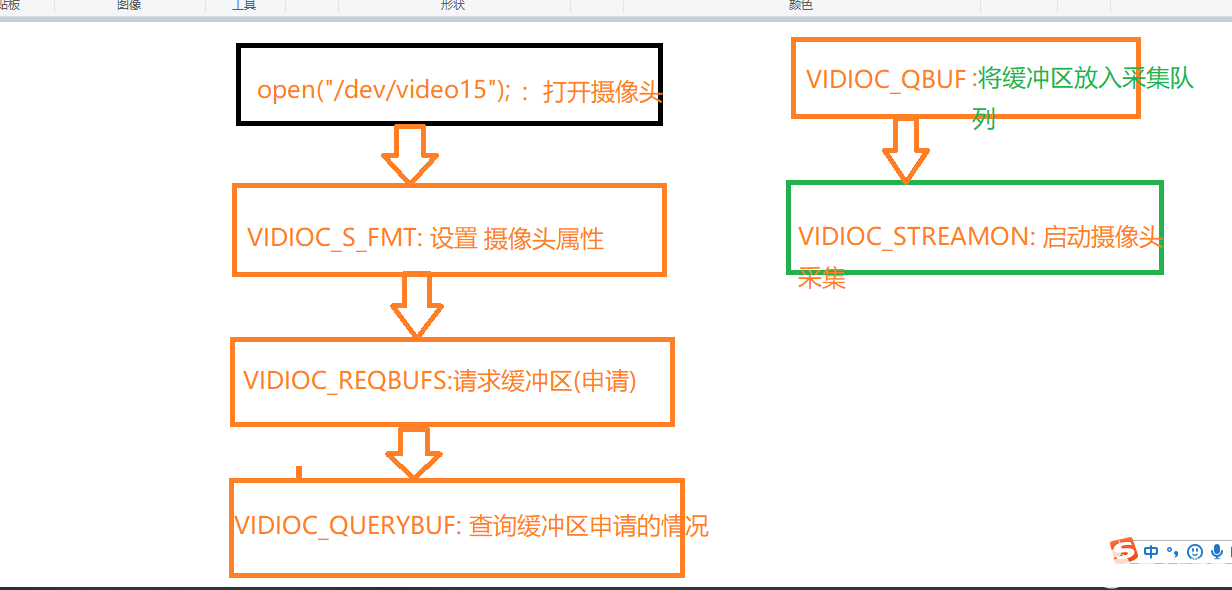
Mmap函数映射。
超声波驱动读取距离:
#include
#include
#include
#include
#include
#include
#include
#include
#include
#include
#include
#include
#include
#include
#include
#include
#include
#include
#include
static unsigned int distance_irq; /*存放中断号*/
static u32 *GPB_DAT=NULL;
static u32 *GPB_CON=NULL;
static u32 distance_time_us=0; /*表示距离的时间*/
/*
工作队列处理函数:
*/
static void distance_work_func(struct work_struct *work)
{
u32 time1,time2;
time1=ktime_to_us(ktime_get()); /*获取当前时间,再转换为 us 单位*/
/*等待高电平时间结束*/
while(gpio_get_value(EXYNOS4_GPX1(0))){}
time2=ktime_to_us(ktime_get()); /*获取当前时间,再转换为 us 单位*/
distance_time_us=time2-time1;
//printk("us=%d\n",time2-time1); /*us/58=厘米*/
}
/*静态方式初始化工作队列*/
static DECLARE_WORK(distance_work,distance_work_func);
/*
中断处理函数: 用于检测超声波测距的回波
*/
static irqreturn_t distance_handler(int irq, void *dev)
{
/*调度工作队列*/
schedule_work(&distance_work);
return IRQ_HANDLED;
}
static void distance_function(unsigned long data);
/*静态方式定义内核定时器*/
static DEFINE_TIMER(distance_timer,distance_function,0,0);
/*内核定时器超时处理函数: 触发超声波发送方波*/
static void distance_function(unsigned long data)
{
static u8 state=0;
state=!state;
/*更改GPIO口电平*/
if(state)
{
*GPB_DAT|=1<<7;
}
else
{
*GPB_DAT&=~(1<<7);
}
/*修改定时器的超时时间*/
mod_timer(&distance_timer,jiffies+msecs_to_jiffies(100));
}
static int distance_open(struct inode *inode, struct file *file)
{
return 0;
}
#define GET_US_TIME 0x45612
static long distance_unlocked_ioctl(struct file *file, unsigned int cmd, unsigned long argv)
{
u32 *us_data=(u32*)argv;
int err;
u32 time_us=distance_time_us;
switch(cmd)
{
case GET_US_TIME:
err=copy_to_user(us_data,&time_us,4);
if(err!=0)printk("拷贝失败!\n");
break;
}
return 0;
}
static int distance_release(struct inode *inode, struct file *file)
{
return 0;
}
/*定义文件操作集合*/
static struct file_operations distance_fops=
{
.open=distance_open,
.unlocked_ioctl=distance_unlocked_ioctl,
.release=distance_release
};
/*定义杂项设备结构体*/
static struct miscdevice distance_misc=
{
.minor=MISC_DYNAMIC_MINOR,
.name="tiny4412_distance",
.fops=&distance_fops
};
static int __init tiny4412_distance_dev_init(void)
{
int err;
/*1. 映射GPIO口地址*/
GPB_DAT=ioremap(0x11400044,4);
GPB_CON=ioremap(0x11400040,4);
*GPB_CON&=~(0xF<<4*7);
*GPB_CON|=0x1<<4*7; /*配置输出模式*/
/*2. 根据GPIO口编号,获取中断号*/
distance_irq=gpio_to_irq(EXYNOS4_GPX1(0));
/*3. 注册中断*/
err=request_irq(distance_irq,distance_handler,IRQ_TYPE_EDGE_RISING,"distance_device",NULL);
if(err!=0)printk("中断注册失败!\n");
else printk("中断:超声波测距驱动安装成功!\n");
/*4. 修改定时器超时时间*/
mod_timer(&distance_timer,jiffies+msecs_to_jiffies(100));
/*杂项设备注册*/
misc_register(&distance_misc);
return 0;
}
static void __exit tiny4412_distance_dev_exit(void)
{
/*5. 注销中断*/
free_irq(distance_irq,NULL);
/*6. 停止定时器*/
del_timer(&distance_timer);
/*7. 取消IO映射*/
iounmap(GPB_DAT);
iounmap(GPB_CON);
/*注销杂项设备*/
misc_deregister(&distance_misc);
printk("中断:超声波测距驱动卸载成功!\n");
}
module_init(tiny4412_distance_dev_init);
module_exit(tiny4412_distance_dev_exit);
MODULE_LICENSE("GPL");
MODULE_AUTHOR("tiny4412 wbyq");
摄像头代码,读取摄像头画面:
#include
#include
#include
#include
#include
#include
#include
#include
#include
#include
#include
#include
#include
#include
#include
#include
#include "framebuffer.h"
#define PWM_DEVICE "/dev/pwm" /*PWM方波设备文件*/
#define DISTANCE_DEVICE "/dev/tiny4412_distance" /*超声波测距设备文件*/
#define UVC_VIDEO_DEVICE "/dev/video15" /*UVC摄像头设备节点*/
#define GET_US_TIME 0x45612 /*获取超声波测量的距离: ioctl命令*/
#define PWM_IOCTL_SET_FREQ 1 /*控制PWM方波频率: ioctl命令*/
#define PWM_IOCTL_STOP 0 /*停止PWM方波输出: ioctl命令*/
int distance_fd; /*超声波设备的文件描述符*/
int pwm_fd; /*PWM方波设备的文件描述符*/
int uvc_video_fd; /*UVC摄像头设备文件描述符*/
int Image_Width; /*图像的宽度*/
int Image_Height; /*图像的高度*/
unsigned char *video_memaddr_buffer[4]; /*存放摄像头映射到进程空间的缓冲区地址*/
/*
函数功能: 用户终止了进程调用
*/
void exit_sighandler(int sig)
{
//停止PWM波形输出,关闭蜂鸣器
ioctl(pwm_fd,PWM_IOCTL_STOP,0);
close(pwm_fd);
close(distance_fd);
exit(1);
}
/*
函数功能: 读取超声波数据的线程
*/
void *distance_Getpthread_func(void *dev)
{
/*1. 打开PWM方波驱动*/
pwm_fd=open(PWM_DEVICE,O_RDWR);
if(pwm_fd<0) //0 1 2
{
printf("%s 设备文件打开失败\n",PWM_DEVICE);
/*退出线程*/
pthread_exit(NULL);
}
/*2. 打开超声波测距设备*/
distance_fd=open(DISTANCE_DEVICE,O_RDWR);
if(distance_fd<0) //0 1 2
{
printf("%s 设备文件打开失败\n",DISTANCE_DEVICE);
/*退出线程*/
pthread_exit(NULL);
}
/*3. 循环读取超声波测量的距离*/
struct pollfd fds;
fds.fd=distance_fd;
fds.events=POLLIN;
int data;
while(1)
{
poll(&fds,1,-1);
ioctl(distance_fd,GET_US_TIME,&data);
printf("距离(cm):%0.2f\n",data/58.0);
data=data/58;
if(data>200) /*200厘米: 安全区域*/
{
//停止PWM波形输出,关闭蜂鸣器
ioctl(pwm_fd,PWM_IOCTL_STOP,0);
}
else if(data>100) /*100厘米: 警告区域*/
{
printf("警告区域!\n");
ioctl(pwm_fd,PWM_IOCTL_SET_FREQ,2);
}
else /*小于<100厘米: 危险区域*/
{
printf(" 危险区域!\n");
ioctl(pwm_fd,PWM_IOCTL_SET_FREQ,10);
}
//ioctl(pwm_fd,PWM_IOCTL_SET_FREQ,pwm_data);
/*倒车影像: 测距有3个档位*/
}
}
/*
函数功能: UVC摄像头初始化
返回值: 0表示成功
*/
int UVCvideoInit(void)
{
/*1. 打开摄像头设备*/
uvc_video_fd=open(UVC_VIDEO_DEVICE,O_RDWR);
if(uvc_video_fd<0)
{
printf("%s 摄像头设备打开失败!\n",UVC_VIDEO_DEVICE);
return -1;
}
/*2. 设置摄像头的属性*/
struct v4l2_format format;
memset(&format,0,sizeof(struct v4l2_format));
format.type=V4L2_BUF_TYPE_VIDEO_CAPTURE; /*表示视频捕获设备*/
format.fmt.pix.width=800; /*预设的宽度*/
format.fmt.pix.height=480; /*预设的高度*/
format.fmt.pix.pixelformat=V4L2_PIX_FMT_YUYV; /*预设的格式*/
format.fmt.pix.field=V4L2_FIELD_ANY; /*系统自动设置: 帧属性*/
if(ioctl(uvc_video_fd,VIDIOC_S_FMT,&format)) /*设置摄像头的属性*/
{
printf("摄像头格式设置失败!\n");
return -2;
}
Image_Width=format.fmt.pix.width;
Image_Height=format.fmt.pix.height;
printf("摄像头实际输出的图像尺寸:x=%d,y=%d\n",format.fmt.pix.width,format.fmt.pix.height);
if(format.fmt.pix.pixelformat==V4L2_PIX_FMT_YUYV)
{
printf("当前摄像头支持YUV格式图像输出!\n");
}
else
{
printf("当前摄像头不支持YUV格式图像输出!\n");
return -3;
}
/*3. 请求缓冲区: 申请摄像头数据采集的缓冲区*/
struct v4l2_requestbuffers req_buff;
memset(&req_buff,0,sizeof(struct v4l2_requestbuffers));
req_buff.count=4; /*预设要申请4个缓冲区*/
req_buff.type=V4L2_BUF_TYPE_VIDEO_CAPTURE; /*视频捕获设备*/
req_buff.memory=V4L2_MEMORY_MMAP; /*支持mmap内存映射*/
if(ioctl(uvc_video_fd,VIDIOC_REQBUFS,&req_buff)) /*申请缓冲区*/
{
printf("申请摄像头数据采集的缓冲区失败!\n");
return -4;
}
printf("摄像头缓冲区申请的数量: %d\n",req_buff.count);
/*4. 获取缓冲区的详细信息: 地址,编号*/
struct v4l2_buffer buff_info;
memset(&buff_info,0,sizeof(struct v4l2_buffer));
int i;
for(i=0;i> 8;
g = (y - (88 * u) - (183 * v)) >> 8;
b = (y + (454 * u)) >> 8;
*(ptr++) = (r > 255) ? 255 : ((r < 0) ? 0 : r);
*(ptr++) = (g > 255) ? 255 : ((g < 0) ? 0 : g);
*(ptr++) = (b > 255) ? 255 : ((b < 0) ? 0 : b);
if(z++)
{
z = 0;
yuyv += 4;
}
}
}
int main(int argc,char **argv)
{
int data;
/*1. 注册将要捕获的信号*/
signal(SIGINT,exit_sighandler);
/*2. 创建线程: 采集超声波测量的距离*/
pthread_t threadID;
pthread_create(&threadID,NULL,distance_Getpthread_func,NULL);
pthread_detach(threadID); //设置分离属性
/*3. 初始化摄像头*/
UVCvideoInit();
/*4. 初始化LCD屏*/
framebuffer_Device_init();
/*5. 循环采集摄像头的数据*/
struct pollfd fds;
fds.fd=uvc_video_fd;
fds.events=POLLIN;
struct v4l2_buffer buff_info;
memset(&buff_info,0,sizeof(struct v4l2_buffer));
int index=0; /*表示当前缓冲区的编号*/
unsigned char *rgb_buffer=NULL;
/*申请空间:存放转换之后的RGB数据*/
rgb_buffer=malloc(Image_Width*Image_Height*3);
if(rgb_buffer==NULL)
{
printf("RGB转换的缓冲区申请失败!\n");
exit(0);
}
while(1)
{
/*1. 等待摄像头采集数据*/
poll(&fds,1,-1);
/*2. 取出一帧数据: 从采集队列里面取出一个缓冲区*/
buff_info.type=V4L2_BUF_TYPE_VIDEO_CAPTURE; /*视频捕获设备*/
ioctl(uvc_video_fd,VIDIOC_DQBUF,&buff_info); /*从采集队列取出缓冲区*/
index=buff_info.index;
//printf("采集数据的缓冲区的编号:%d\n",index);
/*3. 处理数据: YUV转RGB\显示到LCD屏*/
//video_memaddr_buffer[index]; /*当前存放数据的缓冲区地址*/
/*3.1 将YUV数据转为RGB格式*/
yuv_to_rgb(video_memaddr_buffer[index],rgb_buffer,Image_Width,Image_Height);
/*3.2 将RGB数据实时刷新到LCD屏幕上*/
framebuffer_DisplayImages((800-Image_Width)/2,0,Image_Width,Image_Height,rgb_buffer);
/*4. 将缓冲区再次放入采集队列*/
buff_info.memory=V4L2_MEMORY_MMAP; /*支持mmap内存映射*/
buff_info.type=V4L2_BUF_TYPE_VIDEO_CAPTURE; /*视频捕获设备*/
buff_info.index=index; /*缓冲区的节点编号*/
ioctl(uvc_video_fd,VIDIOC_QBUF,&buff_info); /*根据节点编号将缓冲区放入队列*/
}
return 0;
};i++)>
声明:本文内容及配图由入驻作者撰写或者入驻合作网站授权转载。文章观点仅代表作者本人,不代表电子发烧友网立场。文章及其配图仅供工程师学习之用,如有内容侵权或者其他违规问题,请联系本站处理。
举报投诉
-
【倒车影像专题制作】倒车影像安装教程_倒车影像工作原理和设计2016-08-05 0
-
倒车影像2017-03-24 0
-
倒车影像系统简介2016-08-03 1113
-
倒车影像安装方法图文详解2016-08-03 3424
-
360°全景倒车影像原理解读2016-08-03 5317
-
怎样的倒车影像才算好用2016-08-03 953
-
汽车倒车影像相关知识及如何挑选2016-08-03 1146
-
倒车影像系统的工作原理2016-08-03 6661
-
卡车倒车影像系统方案2016-08-03 1064
-
倒车影像系统方案2016-08-03 1317
-
货车导航倒车影像系统方案2016-08-03 1069
-
倒车影像安装教程2016-08-03 1390
-
倒车影像安装教程_倒车影像工作原理和设计2016-08-03 30282
-
Linux应用开发_倒车影像项目介绍2022-06-16 4765
-
Linux小项目-倒车影像功能设计2022-08-14 1541
全部0条评论

快来发表一下你的评论吧 !

